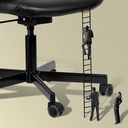The Boeing union wants a board seat and a say on plane safety

Boeing's largest union is in contract talks with the beleaguered airplane company for the first time in more than a decade — and it's seizing the moment to push for cultural change.
Why it matters: The negotiations are taking place amid a full-blown corporate crisis, giving the union incredible leverage.
- The International Association of Machinists is taking the opportunity to negotiate beyond standard line items like pay and retirement benefits — they want a real say in quality and safety standards.
State of play: "It's very important to us that we build a safe, quality airplane," Jon Holden, president of the 32,000-member International Association of Machinists District 751, said earlier this month as talks began.
- The union represents 32,000 workers who assemble airplanes in factories in Washington state.
- This is likely its "first time ever" proposing terms like this, Holden said.
Zoom in: As part of that effort, the union wants a seat on Boeing's board of directors, Holden told the Financial Times this week.
- "With what's going on these days, we are oftentimes the last line of defense," he told the paper. "We have to save this company from itself."
- Union representatives on the board "would serve as a check on the CEO," Leeham News, a trade publication, wrote in January — urging a board shakeup at the company.
The big picture: Boeing is in need of a culture overhaul. Observers and employees believe a decadeslong focus on financial results over safety is behind the company's current woes.
- "There are issues around the safety culture in Boeing," said FAA administrator Mike Whitaker in a recent interview with NBC. "Their priorities have been on production and not on safety and quality. So, what we really are focused on now is shifting that focus."
- In February the regulator gave the company 90 days to come up with a plan to fix quality and safety issues.
Between the lines: Agreeing to the union's board request could be a step in that direction, says Thomas Kochan, a professor emeritus at MIT Sloan School of Management.
- The only way to truly move the culture is if the workforce, the union, and the company are all working on quality and safety, Kochan tells Axios.
What happens when workers get a board seat
Boeing is the second labor union in recent months to try to get a seat on a company's board — and with labor's power rising in the U.S., more unions could follow their lead.
The big picture: Unions in the U.S. don't typically get onto company boards; it's more common in Europe. But for a brief moment back in the 1970s and early 1980s, unions and some companies got interested in the practice — as a concession in contract negotiations that was less costly than, say, raising pay.
- Most famously, in 1980, Chrysler gave the president of the United Autoworkers a seat on its board.
Zoom out: More recently, the union representing Starbucks workers pushed for a board seat but withdrew its effort after the company agreed to start contract negotiations.
- For the Boeing union, though, board representation is more than just a negotiating tactic, says Kochan, who's studied the history of union-management relations at Boeing.
- It "is a very serious proposal — not just something they're putting on the table to trade off for something else."
Reality check: Getting a seat at the table doesn't mean getting a say in company operations, Kochan cautions.
- He should know. In the 1970s, Kochan represented the Teamsters Union on two boards in the trucking industry.
- It was clear at the time that the companies really didn't view his presence as anything more than a trade-off for a wage concession, he says. "You couldn't get the companies to be serious about changing the relationship with the workforce and engaging them as real owners or real partners."
- But if there's a real effort on the part of management, "then having board representation can make a difference."